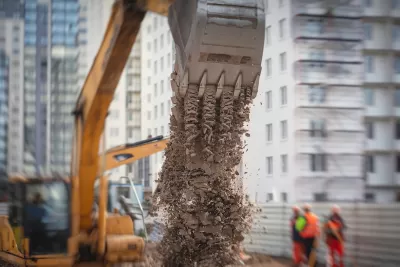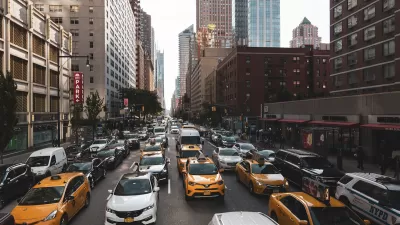New York City’s congestion pricing program, suspended by Governor Hochul earlier this year, would have pumped $12 billion into local projects and jobs.

Companies in the tri-state region surrounding New York City will lose about $12 billion in MTA contracts and 100,000 jobs due to Governor Hochul’s suspension of New York City’s congestion pricing program, a new analysis reveals.
As Gersh Kuntzman points out in an article for Streetsblog NYC, roughly $12 billion in capital investments that would have been funded through congestion pricing revenue was set to pay for contracts with private-sector companies throughout the region. “Those companies have done well, and provided thousands of well-paying jobs, in the prior decade of MTA capital expenditures, and would likely have tapped into the 2020-24 capital plan that was partly funded by congestion pricing, but is now being slashed.”
Paradoxically, “Many of the biggest recipients of MTA contracts over the past decades are in districts represented by avowed congestion pricing opponents.” A senior policy advisor for Reinvent Albany, the group that conducted the analysis, “was surprised that so many lawmakers object to a plan to fund MTA capital improvements that end up benefitting so many of their constituents and local businesses.”
FULL STORY: Hochul’s Congestion Pricing ‘Pause’ Will Cost Area Companies Billions

Montreal Mall to Become 6,000 Housing Units
Place Versailles will be transformed into a mixed-use complex over the next 25 years.

Planetizen Federal Action Tracker
A weekly monitor of how Trump’s orders and actions are impacting planners and planning in America.

Four Reasons Urban Planners Can’t Ignore AI
It’s no longer a question of whether AI will shape planning, but how. That how is up to us.

Bend, Deschutes County Move to Restrict Major Homeless Encampment
City and county officials are closing off portions of an area known as Juniper Ridge where many unhoused residents find shelter, hoping to direct people to housing and supportive services.

High Housing Costs Driving Down Transit Ridership in LA
When neighborhoods gentrify and displace lower-income residents, transit ridership suffers, new research shows.

Iowa Legalizes Accessory Dwelling Units
A new law will allow property owners to build ADUs on single-family lots starting on July 1.
Urban Design for Planners 1: Software Tools
This six-course series explores essential urban design concepts using open source software and equips planners with the tools they need to participate fully in the urban design process.
Planning for Universal Design
Learn the tools for implementing Universal Design in planning regulations.
City of Mt Shasta
City of Camden Redevelopment Agency
City of Astoria
Transportation Research & Education Center (TREC) at Portland State University
City of Camden Redevelopment Agency
Municipality of Princeton (NJ)
Regional Transportation Commission of Southern Nevada





























